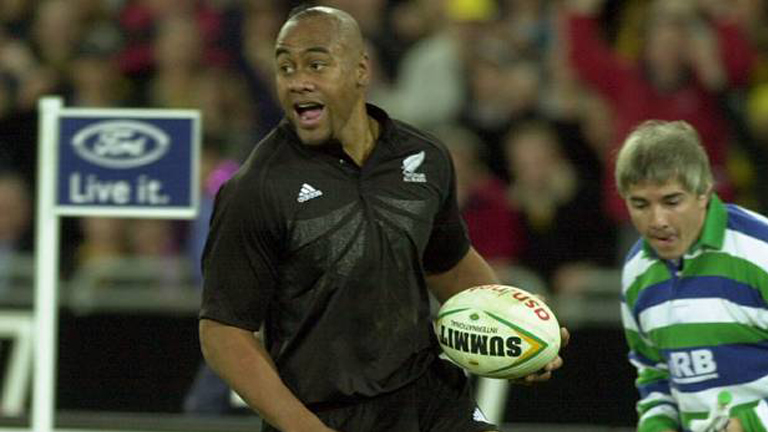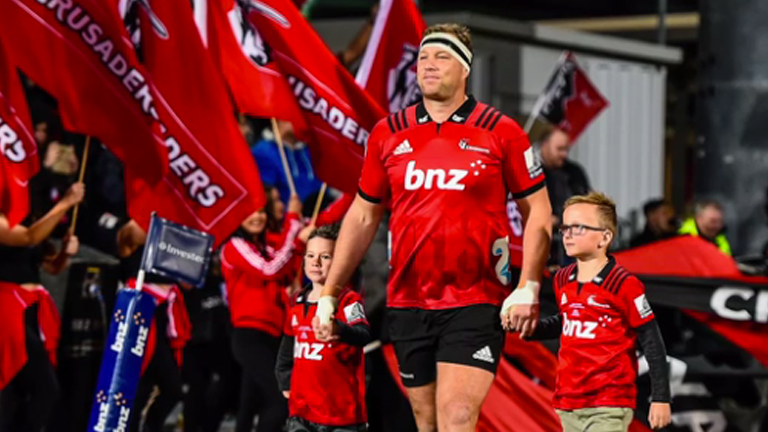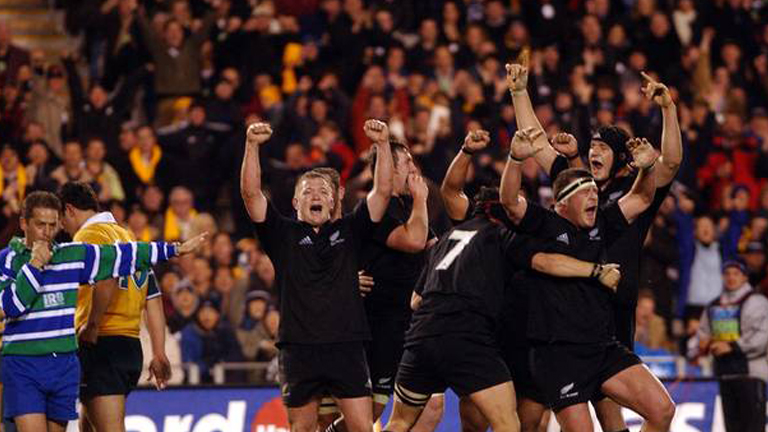Bad blood in the Bledisloe
How a century of sporting rivalry descended into drama, scandal and subterfuge.
Words / Gregor Paul. Design / Paul Slater

t was a massive relief for former Wallabies coach Ewen McKenzie when he dramatically announced he’d quit.
Looking back, it’s apparent he didn’t have the stomach for it. He either didn’t enjoy or simply couldn’t handle that the job came with an endless battle of wits against All Blacks coach Steve Hansen.
The psychological warfare seemed to overwhelm McKenzie, who never quite understood that his tenure would be defined by what his side produced during the Bledisloe Cup.
His agony was total on October 18, 2014. Half an hour after he saw Colin Slade land a conversion in the 83rd minute to win the third Bledisloe, McKenzie revealed that he’d resigned earlier that day.
The drama was intense but it was only just starting. Waratahs coach Michael Cheika replaced him and the mutual respect that formed an albeit tenuous foundation to the rivalry between the Wallabies and All Blacks started to collapse to such an extent that less than two years later the New South Wales police were questioning executives from both national unions.
This is the story of how the greatest rivalry in world rugby unravelled in the most spectacular way.

t’s the morning after the All Blacks’ dramatic late escape in Brisbane and Hansen privately tells a select group of New Zealand media that the Wallabies would be a great team to coach.
They have all the potential in the world.
He suspected, was almost certain, that Cheika would take over — doubling up as Waratahs coach in 2015 and then focusing on just the national team.
He was spot on, but interestingly he never offered an opinion about whether he felt Cheika had the ability to unlock the Wallabies’ obvious potential.
His silence spoke volumes. Hang around for long enough and you get a gauge on how Hansen feels about rival coaches.
Hansen and Springboks coach Heyneke Meyer had a genuine friendship. There was nothing but respect and admiration for Ireland’s Joe Schmidt; Eddie Jones would often text and the two would catch up and enjoy some banter but there was no means by which to get a read on how he felt about Cheika.
The All Blacks’ relationship with the Wallabies had been unravelling long before Cheika took the helm.
New Zealand’s dominance since 2003 had been total and the more they won, the colder and more aggressive relations between the two nations became.
Like most relationships, there isn’t a specific point in time or act to which the origins of the breakdown can be traced.
The sense of betrayal New Zealand Rugby felt at losing the 2003 World Cup co-hosting rights could, possibly, be considered the start of what could be dubbed the Cold War.
Australia’s decision to not vote for New Zealand’s bid to host the 2011 tournament compounded matters.
Then there was the peculiar sight in 2007 of Robbie Deans walking out of NZR headquarters after being told he hadn’t landed the All Blacks job, to 24 hours later being unveiled as the Wallabies coach in Sydney.
A spiteful edge to games developed in the Deans era, and the simmering feud between Quade Cooper and Richie McCaw defined where things were at.
The Wallabies felt an element of torment in their endless inability to wrestle back the Bledisloe and they couldn’t hide their hurt.
New Zealand had, by winning 27 of the 32 Bledisloe Cup tests between 2003 and 2014, very much become big brother.
And as big brother there were times when they goaded the Wallabies. Ahead of McKenzie’s first Bledisloe test, Hansen said he was dumbfounded at the selection of Kurtley Beale at No 10 and suggested it was forced upon him by his bosses who were worried about the NRL poaching the play-maker.
There were times when the All Blacks ignored them, times when they treated them with disdain and by the end of McKenzie’s reign, it had reached the stage where there was even a sense of pity emanating from the All Blacks.
Cheika, a self-made millionaire with a ferocious desire to win, was determined to no longer allow the Wallabies to be cast as victims.
He wanted to build a side that could regularly beat the All Blacks and to do that, he and his players were going to adopt a belligerent mind-set.
That much became clear 50 minutes into the first Bledisloe test on his watch in Sydney 2015 when All Blacks captain Richie McCaw, sick of the endless jersey pulling, obstruction and niggle, turned to referee Wayne Barnes and said: “If you don’t do anything to sort this out, we will.”
Neither McCaw nor Barnes did sort it out and Cheika’s reign began with a 27-19 victory.
Statement made, with another coming a few days later when he picked Quade Cooper to start the next game at Eden Park, blithely claiming to be oblivious to the history of that particular combination.
“I think I am the only one who didn’t know about [Cooper’s Kiwi past], to be honest,” said Cheika, pointedly trying to claim the history of it all was beneath him and big bad All Blacks were all myth.
His feigned nonchalance back-fired when Cooper had yet another nightmare, was yellow carded and the All Blacks stormed to a 41-13 victory.

Perhaps it was the crushing defeat at Eden Park and with it, the realisation of how resilient the All Blacks are which led to Cheika and the Wallabies intensifying their belligerence.
The first signs that the Cold War had become colder came on the Tuesday before the World Cup final when having seen how the official Wallabies Facebook page changed in an earlier post All Blacks to New Zealand, speculation started that Cheika had banned his players from using the former term.
He tried to laugh it off when he was asked about it, saying: “Read a bit about that. Having a bit of a crack at me that I don’t say that for a certain reason. But if you notice, I never call Australia the Wallabies either. I’m really a bit old fashioned in that way. There’s no secret squirrel.”
Not so easy to dismiss was the piece of paper he was photographed holding at the captain’s run at Twickenham the day before the final.
A photographer with a long lens snapped what appeared to be a range of tactical ploys that included plans to “rattle” Kieran Read; expose Julian Savea and Nehe Milner-Skudder on defence; watching for Ma’a Nonu cutting in against a rush defence and “no Carter rage” whatever that meant.
The All Blacks, who said nothing in the week of the final to avoid the prospect of it being twisted in the media to provoke the Wallabies, wondered whether Cheika had deliberately exposed the paper as some kind of psychological ploy to upset those individuals who were being targeted.
If it was a ploy, it didn’t work. The All Blacks were ruthless on the day. Focused, intense and not willing to react to any of the off-the-ball nonsense they felt had become endemic in the Wallabies under Cheika.
They didn’t even fire up when David Pocock stood on McCaw’s face in the first half.
Cheika had brought a new attitude but it yielded the same old results and like Eddie Jones, John Connolly, Robbie Deans and McKenzie before him, he hadn’t found a way to prise the World Cup or Bledisloe Cup out of the All Blacks’ grasp.
Any semblance of there being mutual respect underpinning the rivalry was shattered after the World Cup.


The All Blacks arrived in Sydney a week before the first Bledisloe test in 2016 to find that Cheika had vented to the local media — claiming New Zealand had no respect for Australia.
It was a vitriolic blast that signalled the depth of ill-feeling that had percolated the Wallabies’ camp.
Cheika no longer seemed controlled and measured. Instead he sounded enraged, bitter, obsessed even, as if he’d let Hansen and the All Blacks take residence in his head.
It wasn’t a great time to appear out of control as the day after Cheika’s rant, Monday August 15, security consultant Adrian Gard, found a listening device in one of the chairs in the team room at the Sydney hotel at which the All Blacks were staying.
It was an astonishing discovery and one that would have the most explosive impact in the relationship between the two teams.
Up until the discovery of the listening device, the inter-action between the Wallabies and All Blacks had followed what was a predictable path given the history, continued dominance of one team and the respective personalities of both coaches.
Cheika and Hansen have common traits. They both like to know everything going on in their respective camps and they are both driven to win.
The question post discovery of the bug, essentially became, to what degree were both men prepared to chase victory?
It didn’t have to be like that, but Cheika felt the All Blacks had him pinned as the number one suspect in planting the bug. And while NZR say they have never made any accusations, their actions in the days following the discovery of the bug justify Cheika’s grievance.
NZR’s decision to not alert the police for five days after the discovery of the bug was a massive failing of protocol that has never properly been explained.
Nor has NZR said why chief executive, Steve Tew, at a prearranged dinner on the Friday before the test, showed his ARU counterpart Bill Pulver a picture of the device on his phone and asked for an explanation.
When the New Zealand Herald broke the story about the bug on the day of the test, the Wallabies saw it as a pre-meditated attempt to unsettle them and put them under suspicion.
Whether it was a situation NZR had contrived or not, the sight of New South Wales police detective sergeant Paul Mangan outside the All Blacks Double Bay hotel announcing that an investigation had been launched, sent a shiver through both camps as the prospect of someone going to jail suddenly became real.
What got lost in the furore about the bug was that the All Blacks destroyed the Wallabies in Sydney.
That was salt in an open wound for Cheika and the Wallabies came to Wellington seven days later with what appeared to be anger in the system. They played with a near reckless desire to niggle the All Blacks and play them off the ball.
All Blacks flanker Sam Cane would say later:
“We knew they would come out a lot more physical and potentially with a bit of niggle.
“The way they went about it was probably what caught us off guard just a fraction but we acknowledged it pretty quickly that that was how they were going to play.”
It was relentless, as were captain Stephen Moore’s attempts to whine to Romain Poite with the referee losing patience by the second half and refusing to deal with him.
“I’m not quite sure why,” said Cheika, “but there was a time there in the game, in a break in play, where the national captain of Australia was asking the referee, ‘when might be a good opportunity for me to talk to you?’“He just ignored him.
The referee might not like the captain personally, that might be his prerogative, but he has to afford him that opportunity if he’s affording it to his opponents.”
Cheika hadn’t finished there, though, as he then claimed Hansen had held a meeting pre-game with the referee which was totally against the rules.
He hadn’t. Hansen had been collared by assistant referee Jaco Peyper at the All Blacks hotel during the week, with the South African asking for feedback on his performance in the Sydney test.
As for Cheika’s views about Poite, Hansen offered the sage advice that perhaps the Wallabies needed to look at themselves and ask why the referee had treated them that way.
Unbeknown to the public in the aftermath of the All Blacks 29-9 victory in Wellington which secured the Bledisloe Cup for another year, the New South Wales police were stepping up their investigation.
Mangan and his team quizzed the All Blacks management group — manager Darren Shand, Hansen and security consultant Gard — as well as Tew.
It transpired, not that it was realised at the time, that early in the interviewing process, Mangan had become suspicious of Gard, but that, however, didn’t stop the police from marching into the ARU headquarters in Sydney shortly before the third Bledisloe Cup test at Eden Park in mid-October.
The heavy-handedness of it and the serious nature of the inquiry exacerbated the Australian view they were on trial.
When Hansen correctly predicted ahead of the Wallabies picking their team, that Cooper would be dropped, Cheika was willing to hide his annoyance with a bit of black humour.
“The bug is obviously not working anymore so he must have had someone there watching, I don’t know,” Cheika said. “He must have known somehow. I’m not quite sure because the bug is gone. We stayed in Double Bay and did a bit of a broom around and couldn’t find any. He made good on the lotto tickets; get the numbers.”
But there was no humour after the All Blacks won 37-10 to achieve a world record 18th consecutive victory and their fifth straight against the Wallabies.
Neither Cheika nor the Wallabies needed much help in nursing their burning sense of injustice, but they were given some nevertheless on the morning of the test.
The New Zealand Herald ran a caricature of Cheika dressed as a clown and that combined with the police investigation and a poor decision by the match officials to deny Wallabies wing Henry Speight a perfectly good try which would have swung the game, led to one of the more memorable post-match exchanges of recent times.
Asked what he thought about the All Blacks achieving a world record, Cheika said:
“They dressed us up as clowns today. They put our crest on it, so they wouldn’t want our comment,”
Cheika said. “I don’t think they respect our comment, anyway, so we won’t make one.
“They’re on top and we’re nowhere at this stage. That’s the relationship between the teams.
“The thing that got me a bit offside was the accusation that we tried to bug them. Like, really? Hello. Honestly? That’s what would cause that bad blood for me, that show of lack of respect. I wouldn’t even be smart enough to get that stuff organised.
“They hold on to it, drop it on the day of the game. They don’t need to do that stuff. They’re too good anyway.
“It’s only because they want to do it to try and needle either me or us. I don’t want to keep going over the same points, but that [NZ Herald] is obviously their go-to paper. The whole bug thing came out from there.
“We had policemen in our offices asking us questions, asking our management questions. That’s serious stuff to be accusing people of and it’s not true.”
As a study in psychology, it was fascinating to note that the angrier Cheika became, the more Hansen would present as jovial, relaxed and the voice of reason in all the madness.
“For a long time the relationship with Australia has probably been a little frosty and maybe we need to sit down and have a beer together and sort it out,”
Hansen specifically told a group of Australian reporters the day after the test.
“But I think some of it comes down to the fact that the Bledisloe Cup means so much to both teams and when one team’s having a dominant period like we are at the moment, the other team really gets frustrated.”
It was classic big brother stuff — designed to infuriate and antagonise Cheika and intensify the perception the Wallabies coach was delusional and raging at a conspiracy no one else could see.
But there was vindication of sorts for Cheika on February 8, 2017 when the New South Wales police announced they had arrested Gard on the charge of Public Mischief.
The Australian judicial system, with a presumably unintentionally dramatic timing, scheduled Gard’s case in the week leading up to the first Bledisloe clash of 2017.
It was quite amazing theatre that the All Blacks returned to the same hotel in Sydney and almost a year to the day the bug was found, Gard’s hearing began.
If Cheika had been able to initially play the enraged wrongly accused, the All Blacks were suddenly finding they had taken that role.
Shand was required to appear in court and was treated almost as a hostile witness as essentially the prosecution’s case was that Gard had made the whole business up.
There was no hint at what they thought his motive might be but it became apparent in the build-up to Bledisloe one, that the All Blacks were under siege in Sydney.





It was revealed that earlier that year, while attending the official World Cup draw in Japan, Cheika had confronted Hansen about the bug.
“We had a chat in Japan and I made it clear to him that we didn’t highlight [the Wallabies as a guilty party],” said Hansen. “I said to him there are only x amount of people who would take that opportunity [to plant a bug] and whether we would like it or not, if you [Cheika] found a bug in your [Wallabies] team room, we [All Blacks] would be one of those. So we haven’t named them as that and we never will because we don’t know who put it there.
“I don’t know where they feel the inference was because we haven’t said it. We don’t know who put it there and we said at the time and that hasn’t changed. We can’t help how they feel.”
It was presumably coincidental that almost a year after the Aaron Smith toilet tryst scandal broke, there were further revelations printed in the Australian Daily Mail that week and presumably coincidental again that on the morning of the test, the Daily Telegraph broke a story that All Blacks flanker Jerome Kaino had been having a long-running extra marital affair.
Presumably coincidental but from an All Blacks’ perspective the timing was curious. Both stories had been around for months and yet they were published the week the All Blacks were in Sydney.
Was this payback of sorts — a way for the Wallabies to retaliate after [wrongfully] convincing themselves the initial story about the bug was fed to the Herald on match day in 2016?
Whatever, the truth, any attempt, deliberate or otherwise, to de-stabilise the All Blacks that week failed, because late on the Friday afternoon, Gard was found not guilty.
A year-long investigation and trial failed to provide an answer about who was behind the bug.
The ARU’s initial glee on the day of Gard’s arrest — they released a statement with indecent haste almost congratulating the NSW police — dissipated with the verdict.
Without closure, Cheika and the Wallabies were effectively back to being suspects and the relief within the All Blacks camp was obvious.
Hansen had stood by Gard from the outset. The All Blacks coach initially called the charges “bizarre and unbelievable” while captain Kieran Read, had given a character reference at the trial.
The All Blacks celebrated the decision by blitzing the Wallabies off the park the following night, leading 54-7 after 50 minutes, which sent Australian fans heading for the exits long before the final whistle.
The Wallabies’ misery was compounded a week later in Dunedin when having played supremely well to lead with three minutes remaining, they saw the All Blacks conjure a miracle try through Beauden Barrett to secure the Bledisloe for the 14th straight year.
A victory to the Wallabies in the third encounter brought them some sort of solace in that it stopped a seven-test losing streak and was the first game an Australian team of any kind had won against a New Zealand opponent all year.
But ahead of the two teams clashing for the first time in 2018, there remains a mutual distrust and wariness and a simmering animosity that feels as if it is only ever one poorly chosen word away from erupting.
Spygate, as the whole business with the listening device became known, has been a destructive and poisonous force that has eroded respect and goodwill.
There has been untold damage and the last four years sit as the most extraordinary period in a rivalry that stretches back to 1920.
The drama, the scandal and subterfuge have made the Bledisloe Cup the most compelling viewing and no one could possible feel confident predicting what will happen in 2018.





